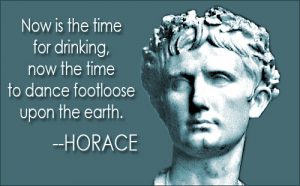Like almost every other scroll written by Philodemus, this one was a reaction, summary and commentary on Crates of Mallus, who was himself commenting on theories by other thinkers. The book is mainly written in the negative, contradicting the theories on literary critique posited by other thinkers, but never really proposing a theory of the Epicurean School. The critiques focus mainly on the lack of clear definition of the terms used, and the ideals expressed, by other schools.
The conversation focuses on what is a poet, what is his role, and what constitutes a good poem, poetic excellence, and a good poet.
Among the arguments presented by other thinkers, we find the issue of whether poetry should have educational or character-building content, whether it should give poetic form to traditional content. Is good poetry charming to the ear and useless, as some argue? Or must the words be useful or have educational value? Philodemus argues that nothing prohibits the poet from creating useful content.
Another opponent says that a poet must use current idioms and possess the art of melody, but Philodemus uses the same critique that he uses for most other arguments throughout the text: these ideals are arbitrary. How are these ideals determined, and how are they judged?
Another opponent argues that poetry must be brief and contain evidence whereas for thought, it must have force of conviction and evidence also. He says this last is the art of the poet, but again Philodemus raises the same critique as he did with the previous one; adding that these criteria can also be applied to prose and are not exclusive to poetry.
Other arbitrary criteria are presented: poems must have vigor, richness, gravity, simplicity, refined conception, elaboration of style, and proper words. Philodemus questions what gravity consists of, and how poems that lack intensite are different from the pompous ones; he questions what is precisely meant by many of these criteria, and what Neoptolemus means by “posessing poetic art and power”, or what is meant elsewhere when it is said that poems must be “serious” and where no examples are provided of what this means, although it may be construed that they should contain wise thoughts and be meant to educate. A long portion of the scroll deals with whether poetry should be without value or serious–in other words, whether it’s purely aesthetic, or also didactic.
One Stoic presents the idea of “the principle of the art”, which again is not clearly defined and is derived from Stoic beliefs in how art is a gift of Divine Reason.
One point of controversy deals with how Philodemus differentiates between the faculties of hearing and of reason. He says it’s ridiculous to say that “a serious composition can’t be grasped by reason, only by ear”, as if the ear had judgement powers.
One argument where Philodemus coincides with other thinkers has to do with how there is a difference between a poet and one who creates great works; in other words, just as some musicians create bad music, so with poets. Another agreement has to do with how a vicious composition can damage a poem, even if it’s refined.
In coinciding regarding these points, Philodemus is conceding that “believe it or not” there are no arbitrary rules to judge poetry, yet rules do exist; he later states that only rhythm charms the ear and that only reason can judge composition.
… which brings us to the Canon. Although the scroll does not produce a literary theory that can be applied to judging poetry, based on the Canon it seems like it would be undeniable that a good poem should produce pleasure in the ear and be enjoyable (therefore appealing to the pleasure faculty within the Canon), and that it may or may not have usefulness. By this, we may be referring to educational value (poetry may help to memorize adages and teachings), or therapeutic benefit depending on the content, as we saw in our discussions on music.
Based on the French translation in Les Epicuriens of the original scroll from Herculaneum titled Les Poèmes V.
Philodemus: On Poems, Book I (Philodemus Translation Series)



